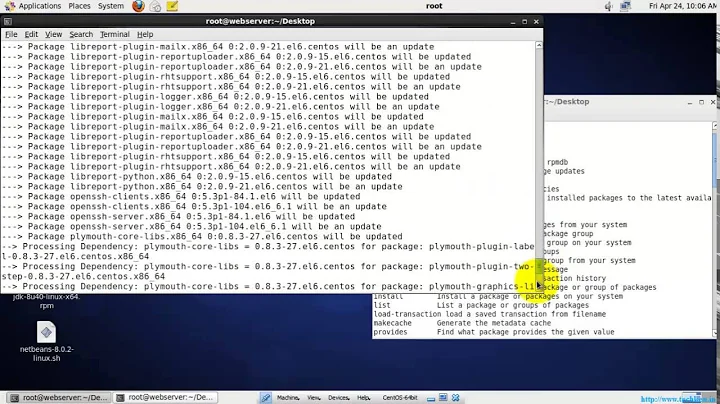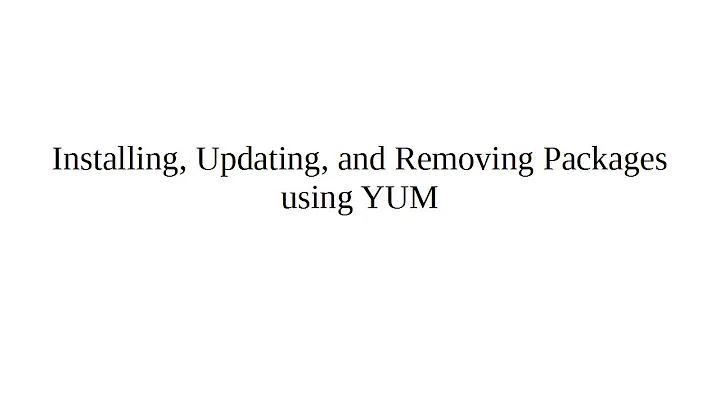Yum installation of package specific modules
The packages perl(Net::Telnet) are what are called virtual packages. They exist only in name and are essentially an "alias" for the real package whose name is really perl-Net-Telnet.
These packages come into existence through their definition within the .spec file as provides or requires. You can see some here in this package, perl-Net-HTTP:
$ more $HOME/rpmbuild/SPECS/perl-Net-HTTP.spec
...
BuildRequires: perl(IO::Socket::IP)
BuildRequires: perl(IO::Socket::SSL) >= 1.38
BuildRequires: perl(IO::Uncompress::Gunzip)
BuildRequires: perl(Symbol)
BuildRequires: perl(URI)
BuildRequires: perl(vars)
The advantage of specifying the package names like this is that dependencies do not have to rely on specific version numbers. Here a dependency can say, "I only need any old version of X".
NOTE: These names only work when doing a yum install 'perl(X)' they do not work with yum search or yum info, for example. If you take a look at the yum man page it discusses the true names of packages that are guaranteed to work with all of YUM's commands in the "SPECIFYING PACKAGE NAMES" section.
How else can you tell?
If you attempt to do an install of one of these and enable yum's verbose messaging you'll see hints:
$ sudo yum --verbose install "perl(Net::HTTP)"
Not loading "blacklist" plugin, as it is disabled
Loading "fastestmirror" plugin
Loading "langpacks" plugin
Loading "refresh-packagekit" plugin
Loading "tsflags" plugin
Not loading "whiteout" plugin, as it is disabled
Adding en_US to language list
Config time: 0.015
Adding en_US to language list
Yum version: 3.4.3
rpmdb time: 0.000
Setting up Package Sacks
Loading mirror speeds from cached hostfile
* fedora: mirror.nexcess.net
* rpmfusion-free: mirror.pw
* rpmfusion-free-updates: mirror.pw
* rpmfusion-nonfree: mirror.pw
* rpmfusion-nonfree-updates: mirror.pw
* updates: mirror.nexcess.net
pkgsack time: 0.043
Checking for virtual provide or file-provide for perl(Net::HTTP)
Obs Init time: 0.385
Package perl-Net-HTTP-6.06-4.fc20.noarch already installed and latest version
Nothing to do
Notice the mentions of "virtual provide" and "file-provide"? These are the dependency engine in yum looking for packages that "provide" what you specified in name, i.e. perl(Net::HTTP), on other packages looking for matches.
You can also lean on repoquery to show you this relationship as well:
$ repoquery -a --whatprovides 'perl(Net::HTTP)'
perl-Net-HTTP-0:6.06-4.fc20.noarch
References
Related videos on Youtube
golem
Updated on September 18, 2022Comments
-
 golem over 1 year
golem over 1 yearI was playing around with
texlivepackage recently and found out that there is a way to install tex style packages withyum install 'tex(package.sty)'command. I've never seen package name was specified like that before. Skimming through yum man page didn't yield relevant information.After some googling I found mentions of possibility of installing Perl modules in a similar fashion, e.g.
yum install 'perl(Net::Telnet)'. Though it didn't work for me.Can someone please provide more information on this type of specifying package name with yum? Are there other packages (besides tex) modules for which can be installed in a similar way? Can I get a list of such packages on my system? Is this an extra functionality that is added to yum as a plugin during installation of a corresponding package (
texlivein this case)?Linux Distro: CentOS 7
-
 slm over 9 yearsIt's done via the list of provides in the spec files. There is no central mgmt of a YUM repo as you're thinking, it's purely driven off of the contents of the .spec files, see the example I showed above with the
slm over 9 yearsIt's done via the list of provides in the spec files. There is no central mgmt of a YUM repo as you're thinking, it's purely driven off of the contents of the .spec files, see the example I showed above with theBuildRequires: X? There's packages that define that they provide X.




